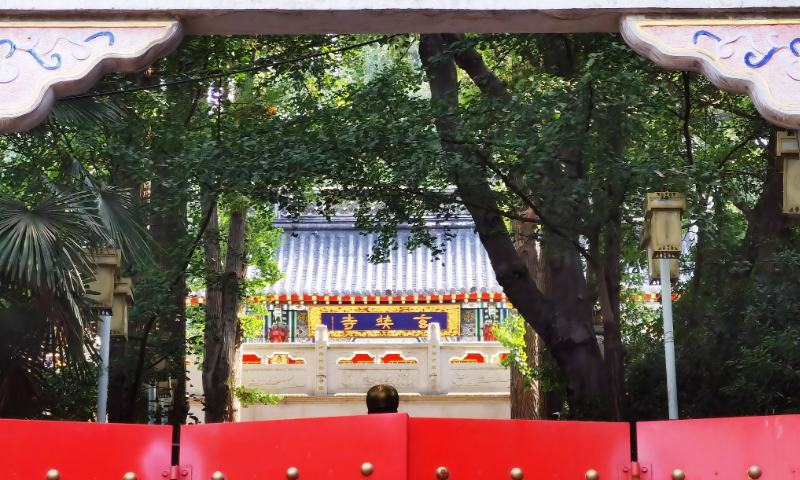
The photo taken on July 23, 2022 shows the Xuanzang Temple in Nanjing is closed for public visits. Photo: VCG
The government of Nanjing, capital of East China's Jiangsu Province, said local police detained a woman named Wu Aping as she enshrined the memorial tablets of Japanese war criminals in a local temple.
The move came after
the incident triggered public outrage on Chinese social media platforms on Friday and netizens called on local authorities to find out who Wu Aping is and why she or he did this.
Amid public anger, the Nanjing government announced on Sunday that in December 2017, Wu, 32,
carried to Nanjing's Xuanzang Temple the memorial tablets of five Japanese criminals who were involved in the Nanjing Massacre during the War of Resistance against Japanese Aggression (1931-45), Iwane Matsui, Hisao Tani, Takeshi Noda, Gunkichi Tanaka and Toshikai Mukai at the price of 100 yuan per tablet per year. She also enshrined the tablet of an American missionary, Minnie Vautrin.
Iwane Matsui was the commander of the Japanese forces occupying Nanjing and a Class A war criminal, who was executed by hanging in 1948. Hisao Tani was the commander of the Japanese Army's Sixth Division during the War of Resistant against Japanese Aggression. Takeshi Noda and Toshikai Mukai had participated in the "killing 100 people competition" in Nanjing. Gunkichi Tanaka was a senior captain and the company commander of the Sixth Division who killed more than 300 civilians and prisoners of war in the city.
On Dec 13, 1937, the Nanjing Massacre began, and over a six-week period, invading Japanese troops killed more than 300,000 Chinese civilians and unarmed soldiers, according to Chinese historians.
Wu told the monk at the temple that these people were her friends and paid 3,000 yuan ($444) at once to put the memorial tablets in the shrine for five years, according to the announcement.
Another woman, whose name was not unveiled, visited the temple in February and saw the tablets of the Japanese criminals and took photos. The monks in the temple then removed these tablets and informed the abbot about the issue. The abbot did not report the issue to related authorities and it did not catch the attention of the public until the photos were posted on social media on Thursday, according to the Nanjing government announcement.
The Nanjing government said that, after an investigation, they found that the move was totally an individual action by Wu and there was no instigation or conspiracy with others.
Born in East China's Fujian in 1990, Wu came to live in Nanjing with her parents in 2000. She went to Beijing to study in a medical school in 2009 and returned to Nanjing in 2013 to work in a hospital providing nursing services. She quit the job in 2019 and went to the Mount Wutai, one of the four sacred Buddhist mountains in China, to become a lay Buddhist.
Wu told the authorities that she suffered psychological trauma and was haunted by nightmares after coming to Nanjing and learning about the history of the atrocities of the Japanese war criminals. After coming into contact with Buddhism, she came up with the wrong idea of "resolving grievances" and "getting rid of suffering" by enshrining the five Japanese war criminals who invaded China, Wu confessed.
Wu honored Minnie Vautrin, whose Chinese name is Hua Qun, as she also wanted to help her.
Minnie Vautrin (1886-1941) taught at the Nanjing Jinling Women's College between 1919 and 1940, when the Nanjing Massacre happened. She set up refugee camps at Jinling Women's College during the Nanjing Massacre of 1937 and 1938, helping to save the lives of women and children. She committed suicide in America in 1941 due to the extreme stress and trauma she suffered during the Nanjing Massacre.
Wu was hospitalized three times since March 2017 and was taking sedative hypnotic drugs, the investigation found.
Out of a selfish and wrong initiative and understanding, she took the memorial tablets of five Japanese war criminals to religious venues. The move seriously violated Buddhism's doctrine to promote good and punish bad, damaged public order and hurt the people's feelings, which is suspected of committing the crime of picking quarrels and making trouble, the Nanjing government said.
The announcement said that the police detained Wu and are still investigating the issue.
The government dealt with the temple as it failed to check the identities of the names on the tablets and did not report the issue after finding out the names of Japanese criminals. The abbot of the temple was removed and is under investigation.
The issue revealed the loopholes in the city's management over religious venues. Several officials were punished, according to the announcement.
The issue also led to the Buddhist associations in multiple Chinese cities, including in South China's Guangdong and East China's Jiangxi, to ask local Buddhism venues to check the memorial tablets they house and report irregular situations.
Religious officials in some places in East China's Zhejiang and North China's Inner Mongolia Autonomous Region have conducted examinations at local Buddhist temples, requiring a clear registration of who dedicated the memorial tablets. The Buddhist association in East China's Jiangxi Province required local temples to report and rectify abnormal tablets.




